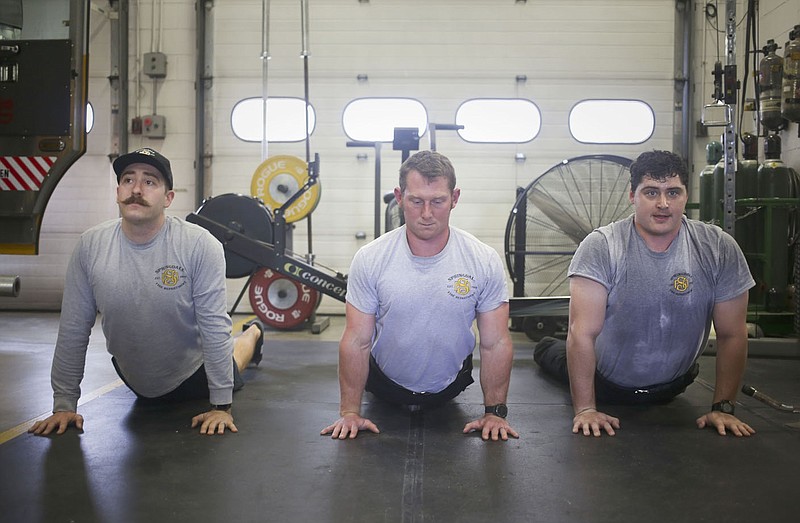SPRINGDALE -- The city's Fire Department this month moved to a new shift schedule that officials hope will result in greater job satisfaction among the employees.
Firefighters now work two days straight before having four days off -- or 48 hours on and 96 hours off. Until Jan. 1, they worked the traditional 24 hours on, 48 hours off schedule.
Fire Chief Blake Holte and Capt. Rance Richardson noted the request for the new schedule came from firefighters. Richardson is vice president of the Springdale Fire Fighters Local 3007 of the International Association of Fire Fighters and the Arkansas Professional Fire Fighters Association.
The 156 front-line Springdale firefighters responded to about 9,200 calls for service in 2021, Holte reported.
Rogers and Fayetteville fire departments also follow the 48/96 shift. Firefighters in the western states have embraced the shifts, citing more time with family and greater job satisfaction, according to several studies.
Rogers went to the 48/96 in 2015, "at the request of the ranks," said Chief Tom Jenkins. Fayetteville adopted it in June 2020 to reduce the chance for contact and contamination from covid-19, reported Thomas Good, assistant chief for support services.
Fort Smith and Van Buren fire commanders say their departments follow the traditional 24/48 shift schedule. They say that schedule works for their departments and they have no plans to change it.
Firefighters will work an average of 56 hours per week on either shift schedule.
Holte said implementing the 48/96 shifts was a two-year process, with the firefighters union members becoming involved.
"They were tasked with questions, and they brought back pros and cons," Holte said. "They had to be willing to be involved and do the legwork. It was going to impact them the most."
The schedule changes won't affect costs for fire departments, say national sources. Good agreed.
Jenkins in Rogers noted the 48/96 shift has cut down on commuting for his firefighters.
"We have a dozen-plus firefighters living in Missouri, Oklahoma and Kansas," he said. The firefighters have cut their commute time and fuel charges in half because they drive to work just one day a week instead of two.
The idea of working a 48/96 schedule likely originated in Kern County, Calif., which has Bakersfield as its county seat, according to an article on shifts in Fire Engineering magazine.
"Firefighters, unable to afford homes in the area, were forced to live great distances from their places of employment," according to the article by Todd L. Poole, who's listed as a firefighter and paramedic in Reynoldsburg, Ohio.
Shift surveys
The Springdale firefighters union polled all department employees and found 90% were willing to work the 48/96 shift, Richardson said. Springdale will take another poll at the end of 2022, a trial year, to determine if the department keeps the 48/96 shift, Holte said.
Fayetteville firefighters took a similar vote with about half of the votes for and and half against the plan before it was implemented, Good said. Rogers conducted votes with similar results, with about 65% saying they wanted to at least try the 48/96 shift, Jenkins said; a vote at the end of the trial year resulted in about 80% to 85% wanting to keep it.
"This was just too important to just push through," Jenkins said.
Fire services across the nation also noted overwhelmingly positive results when polling after a trial year.
"But, like any schedule change, it can be tough on those entrenched," Jenkins said.
Springdale Fire Department officials also had to work with the city clerk and human resources director to make needed changes to the payroll system, Holte said.
"All the negatives were administrative challenges," he noted. "When we knew all the good and bad, there wasn't really a reason not to try it."
"The 48/96 doesn't work for every department," Jenkins said. "And I'm not going to say it will always work with our department.
"But anything that benefits the firefighters is good," he concluded.
Family and feeling good
Local fire officials say more consecutive days off allow more time for firefighters to physically and mentally recover after busy shifts.
Firefighters would go home after a 24-hour shift and sleep a little, "But then the next day is like Sunday, and they're busy getting ready to go back to work," Jenkins said.
With a four-day break, a firefighter might be tired on his first day off, but rest up on the first and have three more to enjoy, he said.
Research about recovery time is hard to find, but some departments switching to the 48/96 shift did report a drop in sick calls.
The Pacifica, Calif., Fire Department reported a 20% reduction in the use of sick days, and the Manhattan Beach, Calif., Fire Department reported an 80% reduction, according to the Fire Engineering article.
Anecdotally, the biggest benefit is a firefighter's job satisfaction.
The extended time allows families to enjoy smaller vacations more often, said Richardson, a captain of Springdale's Station 4.
The 48/96 schedule affords a firefighter 26 entire weekends off, where the 24/48 rotations provide only 17. Firefighters will work both days of the weekend only once every six weeks.
Richardson added he has a newborn son at home and has appreciated the schedule which gives him extended time at home.
But the 48/96 doesn't work for some families, chiefs agreed.
Some firefighters with young children at home expressed guilt over leaving their spouses alone to care for kids for 48 hours, Good said. Jenkins said some of his firefighters with blended families and custody arrangements found making legal changes for these were hard.
Fatigue-fighters
Some fire officials were concerned about additional fatigue in the ranks the second half of the new 48-hour shifts.
"We require our guys to be at the top of their game when they're on shift -- especially those on the ambulance providing critical care," Jenkins said.
Sleep deprivation causes "cognitive or brain fatigue that can result in slowed reaction time, decreased vigilance and impairment in complex reasoning skills," wrote Susan L. Koen, in a 2005 report. Koen is an organizational psychologist and president of Around the Clock Systems in Portland, Maine.
Firefighters who experience one call during their nighttime sleep period -- say, 10 p.m. to 6 a.m. -- typically will complete their first 24-hour workday in a state of mild sleep deprivation, depending on their ease of returning to sleep, Koen said.
Two calls might leave firefighters with moderate sleep deprivation, where cognitive fatigue problems will begin surfacing, she said.
A second day on duty without any restorative sleep could put firefighters at risk for some safety and performance challenges, she continued.
Firefighters at busy stations that average three or more call-outs per on-duty night are likely to be severely sleep-deprived at the end of their 24-hour workday, Koen concluded.
Local departments said they closely monitor firefighters' time on calls during each shift.
Rogers has enough manpower to have paramedics work the first 24 hours of a shift on the ambulance and the second on firefighter duties, Jenkins said. Other paramedics will work the first 24 hours as firefighters, then replace the first crews on the ambulance during the second day of duty, he said.
"If a crew gets three intense calls after midnight, we can send them to a less busy station," he said.
Jenkins said his department has software that will alert command staff when units are used above a certain threshold.
"We'll call, and check on them," he said. "And we ask that our employees create an environment that will let firefighters tell others they are feeling the effects of fatigue."
Holte said Springdale also would rotate firefighters between busy and less busy stations, and also work in some rest time, especially on a shift's second day.
"We have to police ourselves and not overdo it, with help from our shift commanders and captains," Richardson said. He noted firefighters will have to train themselves to the new schedule and stick with a consistent bedtime.
Richardson said 48 hours on is familiar to many firefighters who work extra shifts to fill in when others are off and to earn overtime pay.
But, Jenkins said, excess fatigue is pretty uncommon among firefighters.
"It's a tough job," he said. "And we've got employees who are tough, but we want to make sure."
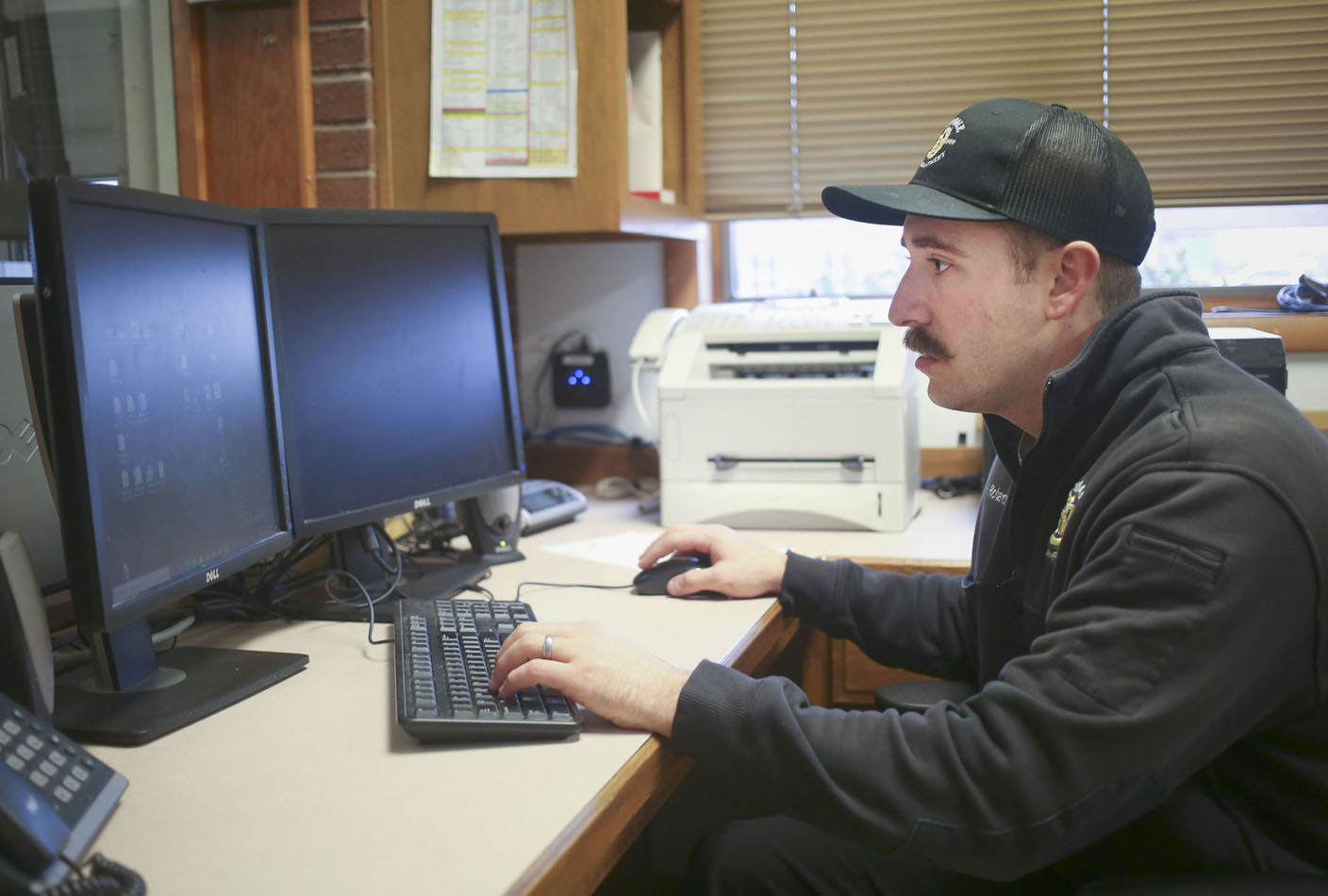 Capt. Rance Richardson of the Springdale Fire Department works on a report Saturday at Fire Station 4 in Springdale. The Springdale Fire Department has since the first of the year operated on a 48/96 shift - 48 on, 96 off or 2 days on, 4 days off. Check out nwaonline.com/220110Daily/ for today's photo gallery. (NWA Democrat-Gazette/Charlie Kaijo)
Capt. Rance Richardson of the Springdale Fire Department works on a report Saturday at Fire Station 4 in Springdale. The Springdale Fire Department has since the first of the year operated on a 48/96 shift - 48 on, 96 off or 2 days on, 4 days off. Check out nwaonline.com/220110Daily/ for today's photo gallery. (NWA Democrat-Gazette/Charlie Kaijo)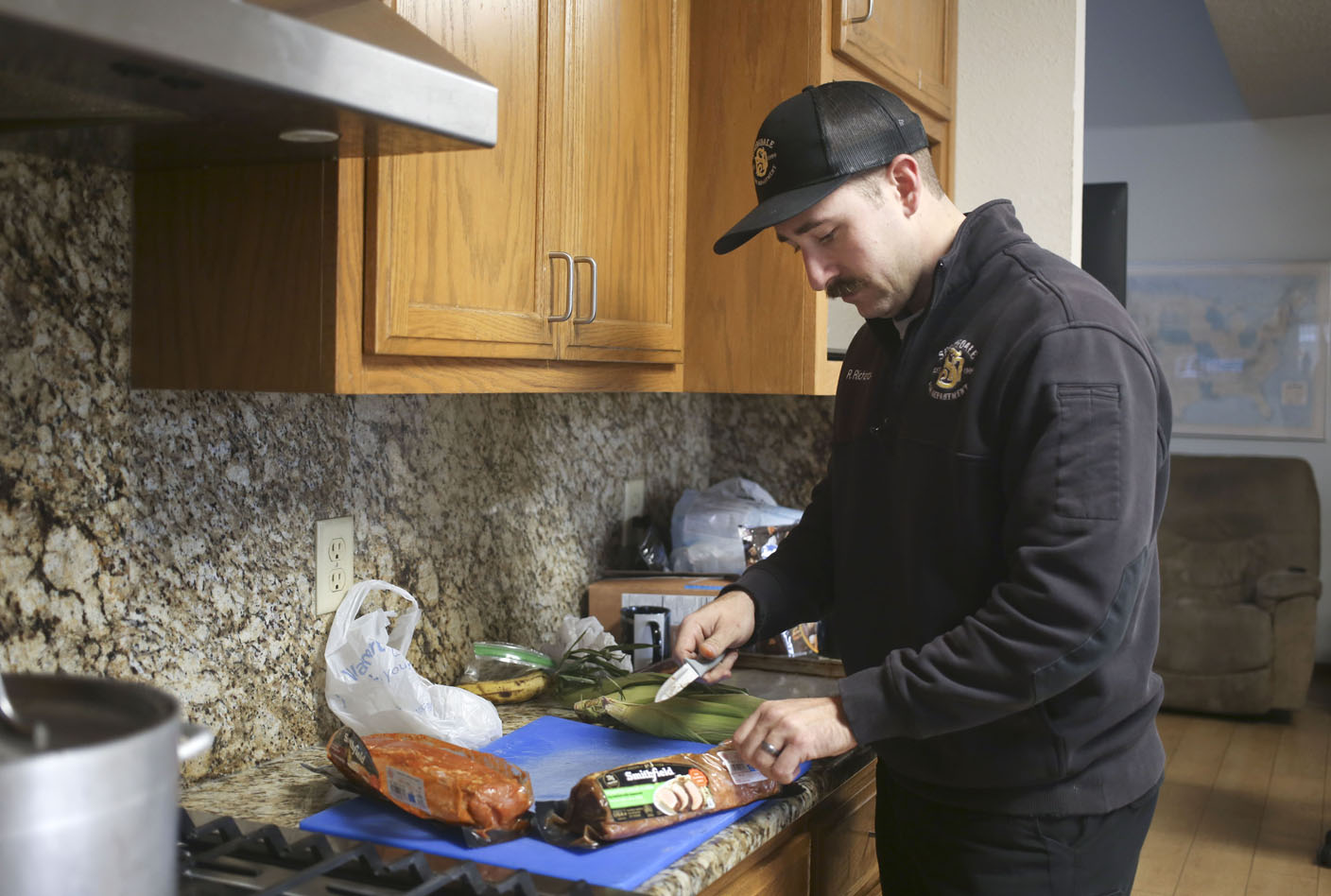 Capt. Rance Richardson of the Springdale Fire Department prepares dinner Saturday at Fire Station 4 in Springdale. The Springdale Fire Department has since the first of the year operated on a 48/96 shift - 48 on, 96 off or 2 days on, 4 days off. Check out nwaonline.com/220110Daily/ for today's photo gallery. (NWA Democrat-Gazette/Charlie Kaijo)
Capt. Rance Richardson of the Springdale Fire Department prepares dinner Saturday at Fire Station 4 in Springdale. The Springdale Fire Department has since the first of the year operated on a 48/96 shift - 48 on, 96 off or 2 days on, 4 days off. Check out nwaonline.com/220110Daily/ for today's photo gallery. (NWA Democrat-Gazette/Charlie Kaijo)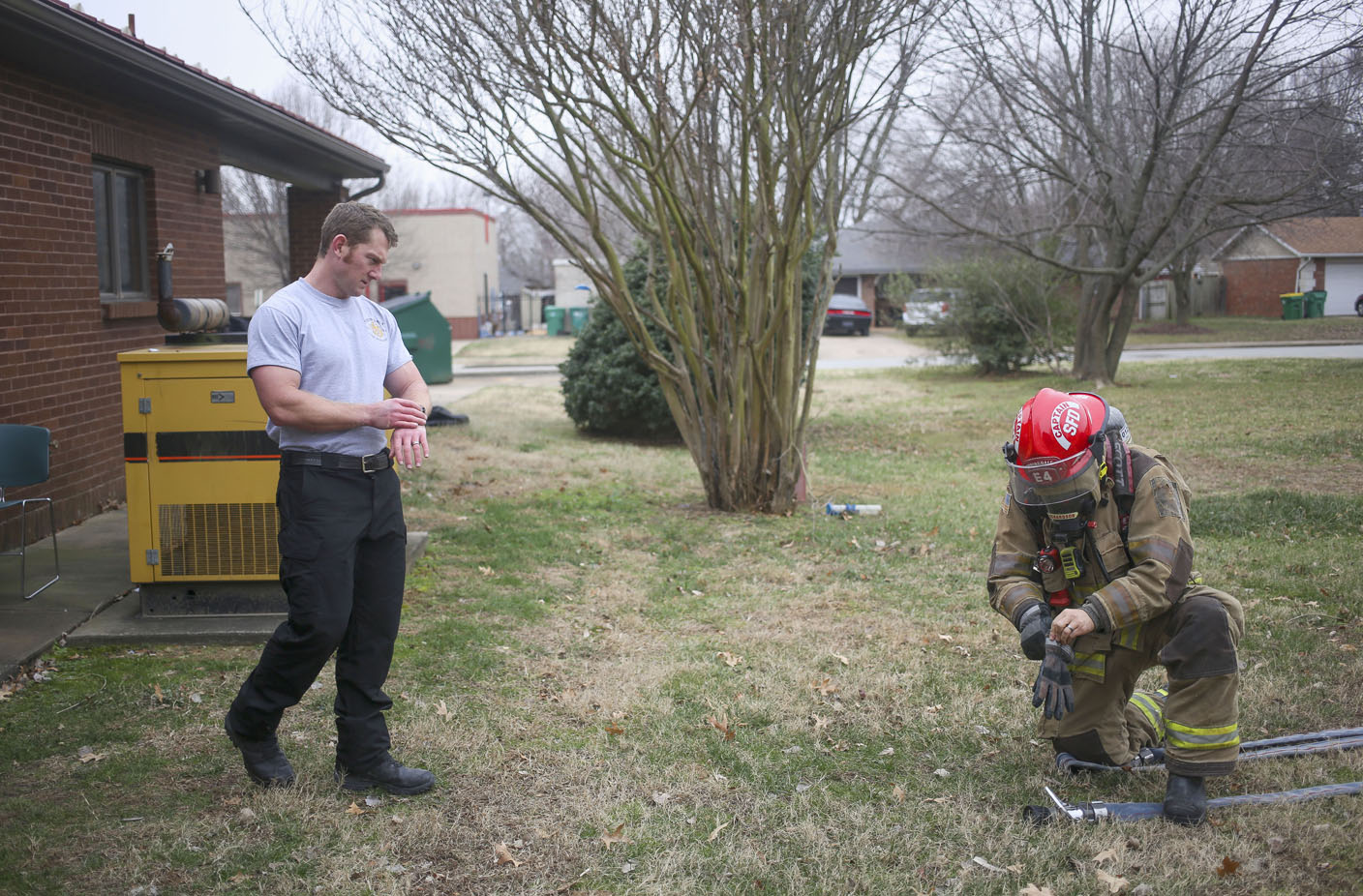 Noah Carter (from left, a driver/operator with the Springdale Fire Department, times Capt. Rance Richardson Saturday as he practices a firefighter drill, at Fire Station 4 in Springdale. The Springdale Fire Department has since the first of the year operated on a 48/96 shift - 48 on, 96 off or 2 days on, 4 days off. Check out nwaonline.com/220110Daily/ for today's photo gallery. (NWA Democrat-Gazette/Charlie Kaijo)
Noah Carter (from left, a driver/operator with the Springdale Fire Department, times Capt. Rance Richardson Saturday as he practices a firefighter drill, at Fire Station 4 in Springdale. The Springdale Fire Department has since the first of the year operated on a 48/96 shift - 48 on, 96 off or 2 days on, 4 days off. Check out nwaonline.com/220110Daily/ for today's photo gallery. (NWA Democrat-Gazette/Charlie Kaijo)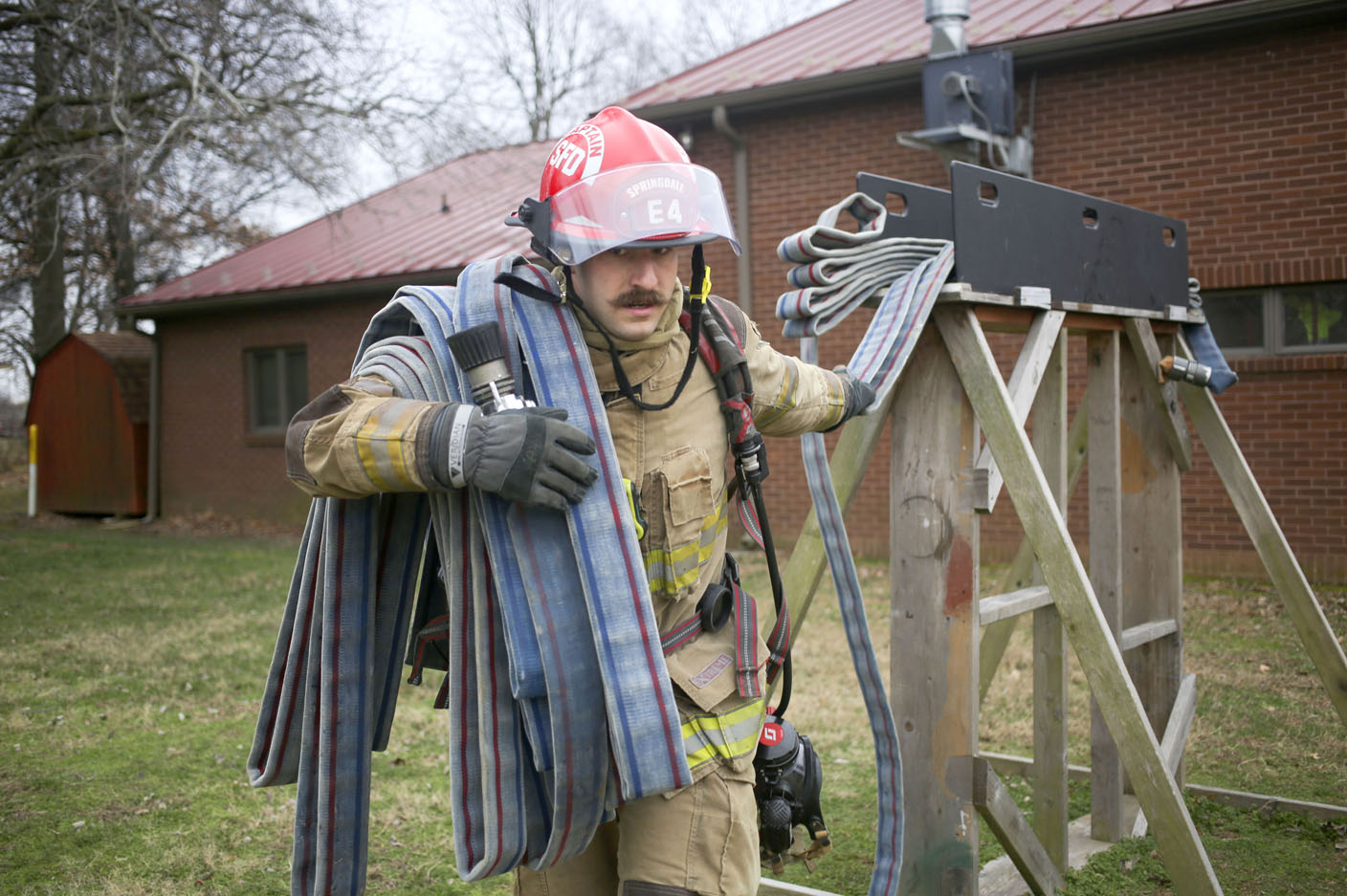 Capt. Rance Richardson of the Springdale Fire Department practices a firefighter drill Saturday at Fire Station 4 in Springdale. The Springdale Fire Department has since the first of the year operated on a 48/96 shift - 48 on, 96 off or 2 days on, 4 days off. Check out nwaonline.com/220110Daily/ for today's photo gallery. (NWA Democrat-Gazette/Charlie Kaijo)
Capt. Rance Richardson of the Springdale Fire Department practices a firefighter drill Saturday at Fire Station 4 in Springdale. The Springdale Fire Department has since the first of the year operated on a 48/96 shift - 48 on, 96 off or 2 days on, 4 days off. Check out nwaonline.com/220110Daily/ for today's photo gallery. (NWA Democrat-Gazette/Charlie Kaijo)